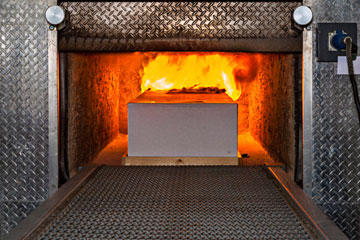
A body in the fire-based crematory oven of Lakewood Cemetery.
(7 of 8)
"Generally, crematories are off the beaten track in areas that are more secluded," says Charlip. He also claims that the job of reducing bodies to ash doesn't necessarily attract the most reliable employees. "Lots of times you've got people who are ex-cons. It's really not the kind of job that a lot of people would want to do. That's not to say that there aren't good, committed people that do it, but the kind of people you're dealing with a lot of times aren't the most reputable. History has borne out the fact that if unscrupulous people are dealing with dead bodies, there's money to be made from dead bodies."
Even so, Charlip said he hasn't been taking on more cremation cases, partially because they're so difficult to win. Plaintiffs often need to show medical evidence of emotional distress, which can be hard to prove, and the threshold for getting those damages can be high. While no organization tallies cremation errors, they don't seem to be increasing along with the cremation rate.
Look at Georgia, where the Tri-State Crematory incident took place, says Kemmis. "The [cremation] rate was 17% in 2002. In 2011, it was 33%. It doubled. But the number of incidents are not doubling. I'm just saying this anecdotally, but there's no way. You'd be writing a lot more on this topic if that were the case." And the allegation that a lot of cremation operators are ex-cons? "I don't see any evidence of that," she says. "The industry standard is to conduct background checks before hiring people. Are they showing up to work in overalls and work boots? Yes, they are. They're not in suits. But that's O.K. They're still doing their job as well as they can."
What We Leave Behind
In the 1980s, when funeral director Mark Musgrove got his start, every funeral was pretty much the same: a welcome, a prayer, a song, a passage of Scripture, another song, a message, a benediction and then a trip to the cemetery. But not today, at least not at Musgrove Family Mortuary.
Oregon has a cremation rate above 70%, and families who choose it often want a unique service to celebrate their loved ones. At Musgrove, instead of "In the Garden," you're more likely to hear "In-A-Gadda-Da-Vida." Video tributes are displayed on big-screen TVs in their chapels and family centers. Memorabilia of a person's life are displayed on memory tables. The funeral home's cremation garden has a waterfall, ponds and a gazebo.
"To survive, we need to adapt," says Musgrove. "We need to listen to the families we serve and find those things that are meaningful to them."
Musgrove Family Mortuary has clearly done so, but others in the industry haven't.
"There are some funeral directors out there who will send someone to another funeral home because they don't handle cremations, because the owner doesn't like them," says Nicodemus.
And they're still in business?
"Not for long," he says. "I guarantee you, it won't be for long."
